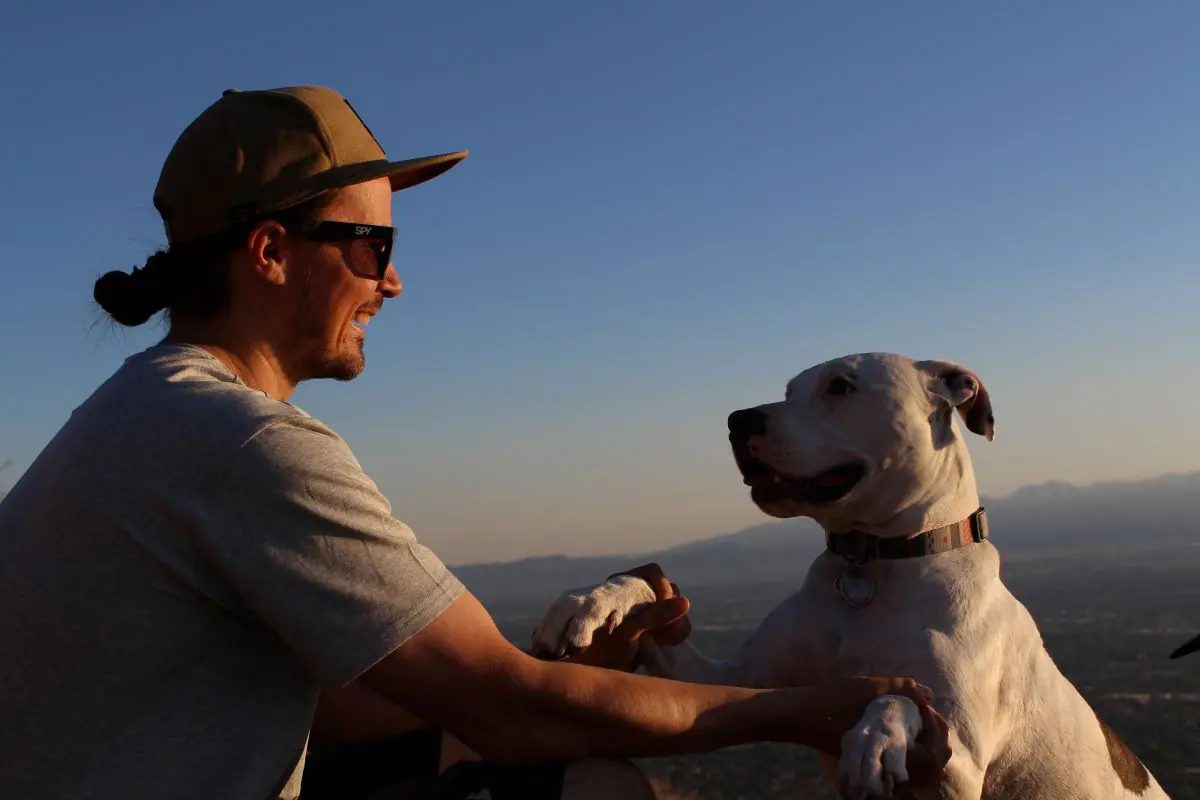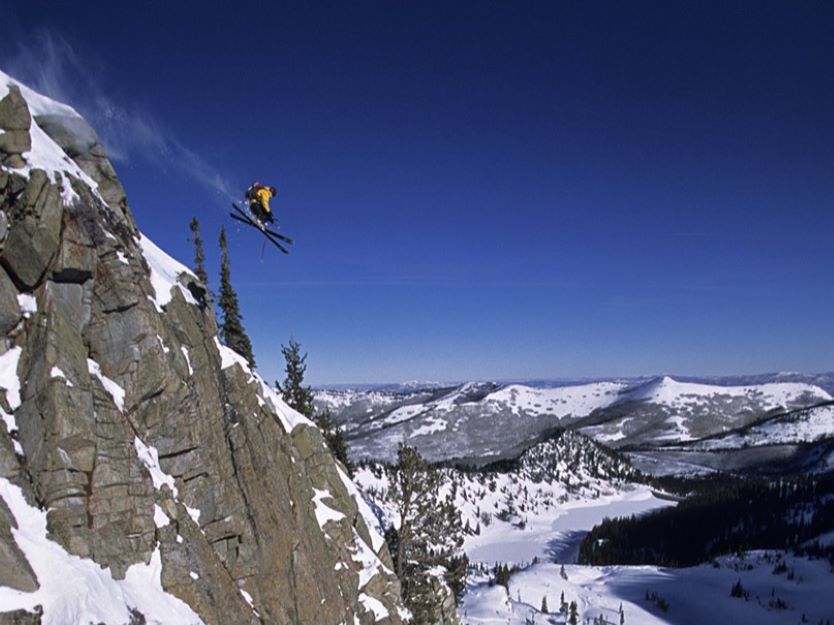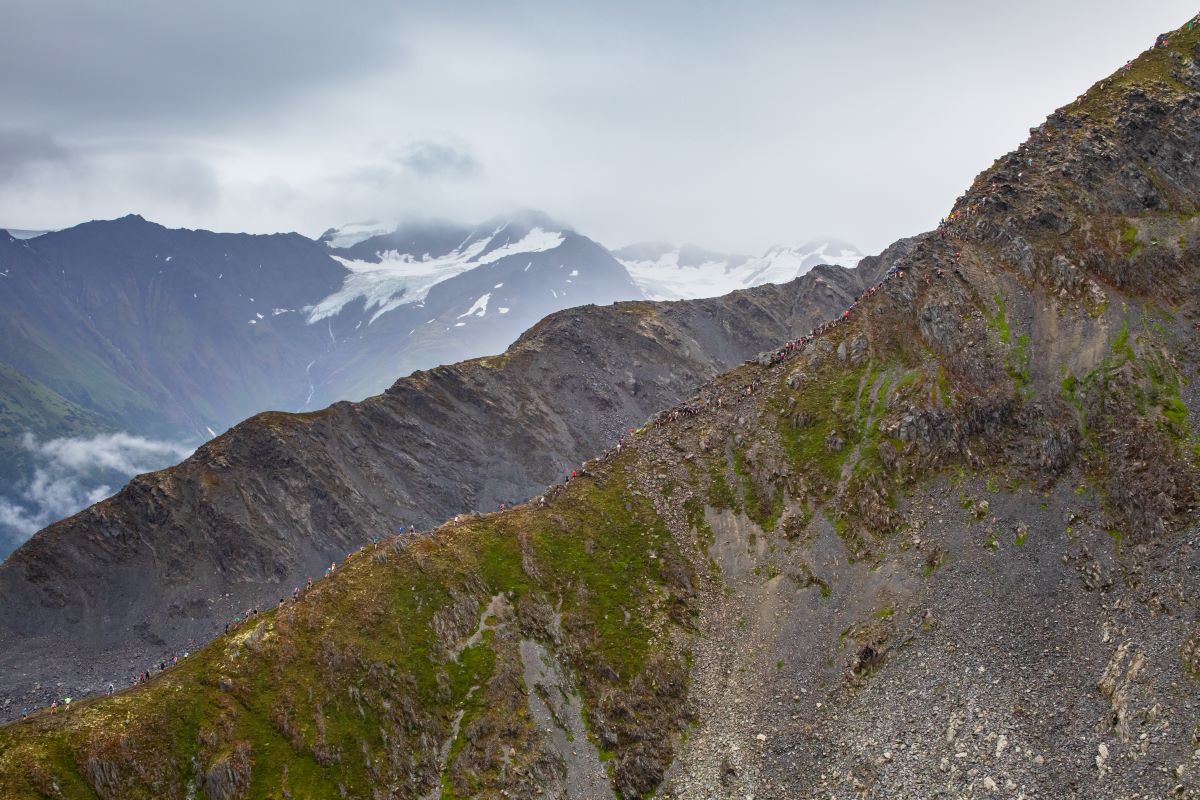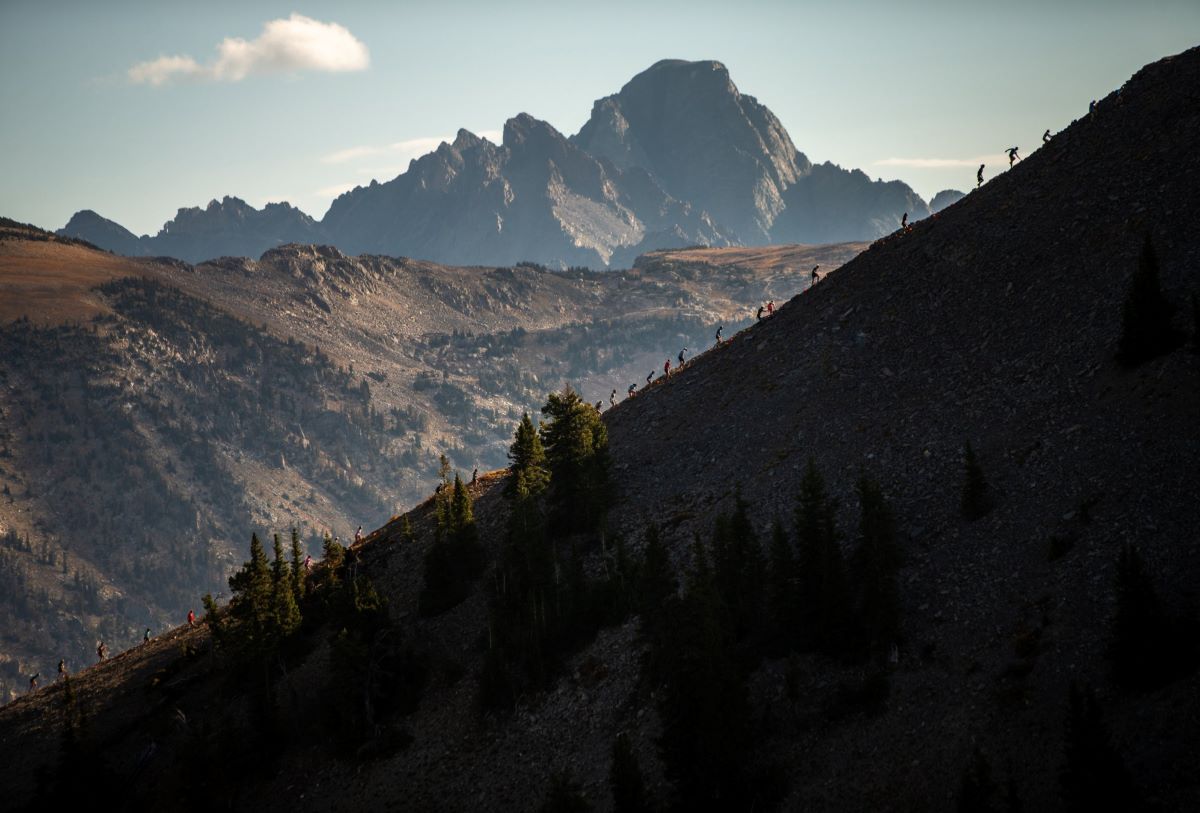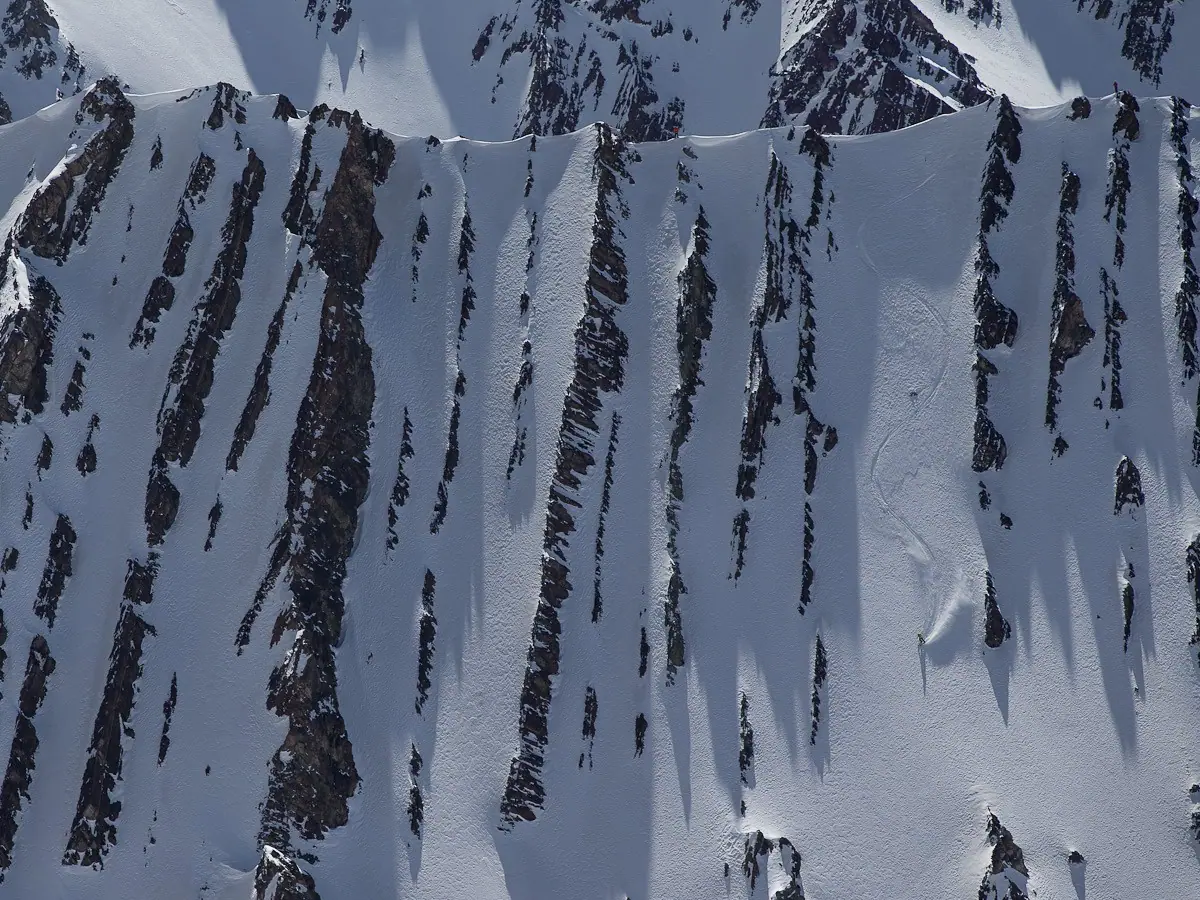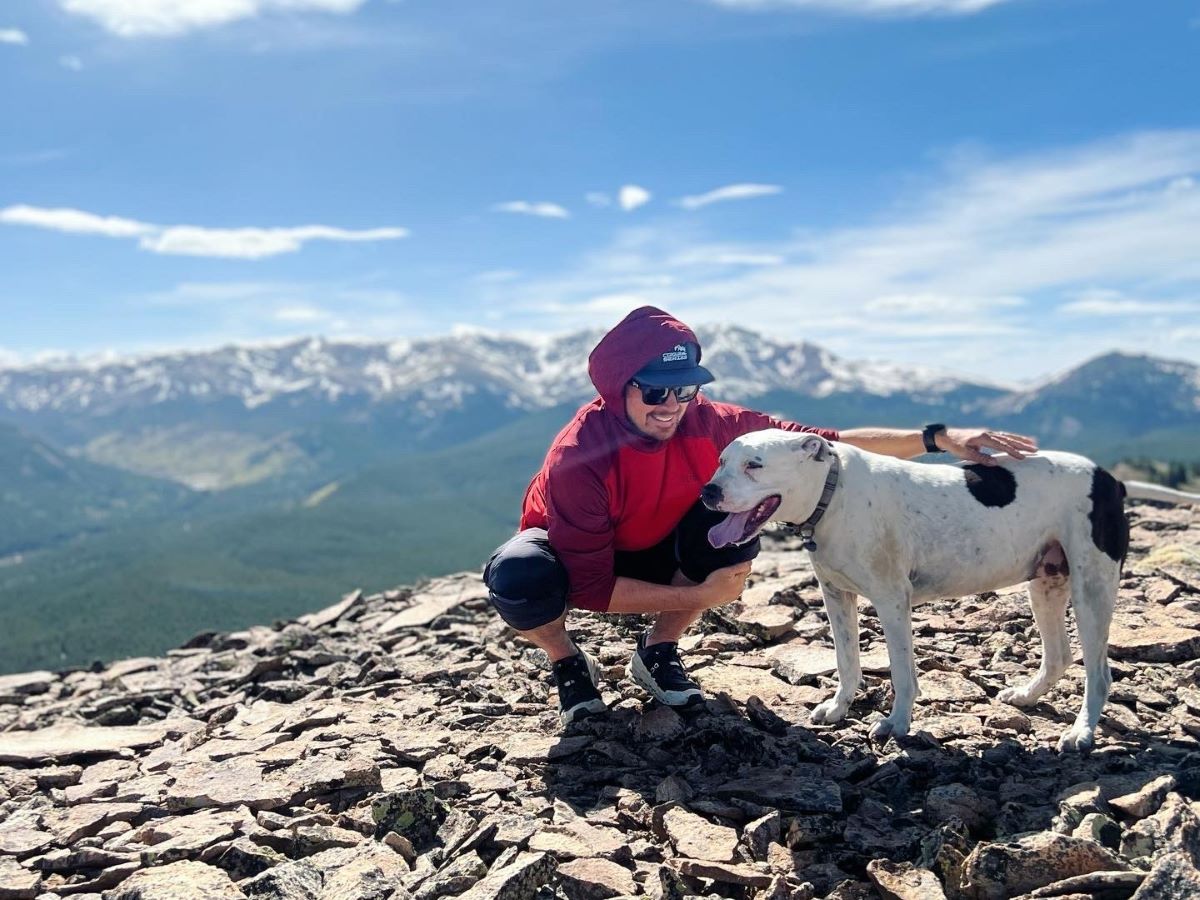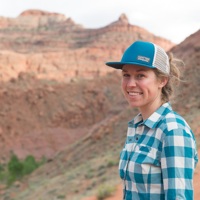Professional skier, entrepreneur, and Cirque Series founder Julian Carr fell in love with mountain running in an organic, roundabout way: one-on-one time with his dog Lexie — an athletic, white Dogo Argentino, which is a pack-hunter breed with agility and sharpness — the perfect adventure partner. It was February 2010. Carr lived near a trailhead for Mount Olympus in Utah’s Salt Lake Valley, where he was born and raised. For the past nine years, he’d mountain bike or wake surf in the off-season gaps between skiing in Chile and Argentina. But being on foot meant he could spend time with his new pup, so they started a daily ritual of climbing Mount Olympus.
“The stats are tough — 5.5 miles roundtrip with 4,000 feet of vert. It’s a grueling hike. Halfway up, there’s a stream. I got into a routine of going to stream and back. I could drive to the trailhead, get to water, and be back at my house in 1.5 hours. That’s a rich adventure that’s way better than being in the gym for an hour. I fell in love with the feeling of getting in shape, seeing the mountain every day, experiencing the different weather and trail conditions, and the gained agility from coming down. I got in the best shape of my life,” described Carr.
Then some buddies sparked a bit of competition. Carr’s friends, who were on a summer wildland firefighting crew, said the team’s fitness benchmark required an ability to reach the stream in less than 30 minutes. Carr was sure he could beat that time.
“After a month of doing that hike, I timed myself, hiking as fast as I could: 31 minutes. I couldn’t believe it. That initiated my love and appreciation for having actual abilities to move quickly up mountains,” said Carr, who became obsessed with his clock all summer and fall. By the time winter hit, he’d whittled his time down to 22 minutes.
“I’ll never be that fast again. It felt amazing to be in that condition. I would usually go into a ski conditioning course [at the gym] going into fall. I was way stronger going into that class than I’d ever been coming out of it.” Throughout winter, Carr continued to hike Mount Olympus when the benches didn’t have snow.
A year into Carr’s trail running, a friend surprised him with a registration to a trail race in Moab, Utah, in spring 2011. “I go down there and it’s super beautiful, and the race is a nice mom-and-pop operation. There are a few hundred people racing. It cost $80. I get second place. I’m like, ‘That’s awesome!’ I think I’m kind of fast for a second,” recalled Carr.
But he noticed something else: a missed opportunity. “People were finishing the race and dying to have a good time. We were the only car that backed up to the finish and cracked a beer on the tailgate to cheer everyone on. Everyone else who finished, left. The post-race experience wasn’t quiet there [back then],” he said.

The race village at the 2022 Cirque Series race at Brighton. Carr saw a need for more festivities and hospitality to accompany mountain races. Photo: Rocko Menzyx
Then it happened again. A couple of weeks later, Carr was invited as a GoPro athlete to the GoPro Mountain Games, a multiday adventure sports competition, in Vail, Colorado. When Carr lined up for the 15k mountain run, he looked around the start and saw, for the first time, runners Joseph Gray and Sage Canaday. He was standing among “the best athletes in the world. I still think I’m going to be competitive. Within the first mile going up, I realized those guys are so unbelievably fast it’s super-human. I’m a mortal, is what I realized.”
But during the race, he again noticed a missed opportunity. “The production value was through the roof, but the course design suffered. They ran us in figure-eights until we hit the distance mark. There was no sense of destination or sense of accomplishment,” said Carr, who became more fired up than ever to find mid-distance, high-vert mountain races to experience.
A Google search yielded very few options. In fact, the only race he could find with those parameters was in Seward, Alaska: the Mount Marathon Race.
“Not only was I shocked that there were not any in Utah — there were none in the Lower 48. I found mud runs, relay races, mom-and-pop 5ks, marathons, and ultramarathons. I could not find a single race that was going to the top of a cool peak and coming back down,” said Carr.
Over the next few years, Carr was enamored with peak bagging. He tried to mountain run every peak in the Wasatch Mountains and in Big and Little Cottonwood Canyons, from Grandeur Peak to Mount Wire, a.k.a. Big Beacon Peak. The final a-ha moment happened on a late April ski trip to Iceland in 2015. He’d climbed a 3,000-foot chute overlooking a stunning fjord. At the top, he waited for 10 minutes for his partners. The sun set over the Arctic Ocean. Full of appreciation for the place, shared experience, and how good his body and mind felt after an hour-long hike, Carr knew he wanted others to experience a similar feeling, too.
Foot races are far more accessible to the general public than skiing, and inclusivity has been a foundational piece of the Cirque Series that Carr launched in summer 2015. The event lineup debuted with four races at ski areas throughout the Rockies including Alta, Crested Butte, Deer Valley, and Snowbird. The following summer, they added a fifth location, the minimum round-up ever since.
“It was fun to tear the lid off of a whole new venture. I rolled up my sleeves and figured out the run race scene, which is such a saturated market. I had a vision for what I thought people would enjoy, because I didn’t see it out there,” said Carr, who was familiar with owning and operating a business from the ground up.
Raised in the mountains, he grew up exploring the area on long hikes with his dad, skateboarding, and doing gymnastics. He gave snowboarding a try in the fifth grade, but took a big crash, spraining his knee. Several years later, his mom talked him into getting on skis. He was in the eighth grade. It clicked.
“From the lift, I could see how body mechanics worked for people. I was parallel skiing, going fast, and I loved it from day one. I knew what I was supposed to do,” he said. Carr skied every weekend throughout high school. Around that time, Teton Gravity Research and Matchstick Productions ski films took flight alongside “Powder Magazine,” “Freeskier,” and “Freeze.”
“I digested every piece of ski content. My verdict was, ‘I can do all that, too.’ I tried to wrap my head around what it meant to be a professional skier. I studied that model and tried to find peers — creatives or other athletes — and to pick their brains. Sponsors started to come together in college. I graduated college and became a pro skier,” said Carr, who studied computer science and economics at the University of Utah.
He also saw a trend. “I saw successful pro skiers getting older. In their thirties, the industry would step aside from them — really big names were lost for what they wanted to do next in life. I said, ‘Note to self, I should have something else going on.’ There is a shelf life as a pro athlete,” he said. So, he launched an apparel brand, Discrete Clothing, named after a computer science course he enjoyed on discrete principles, which “exist in the sense of not supporting or requiring the notion of continuity” — like calculus, trigonometry, or computer algorithms.
Carr was working full-time at a sports bar in downtown Salt Lake City, Utah. He was also a full-time student and didn’t own a computer. His dream of being a professional skier was taking off. He was on skis every day. “I was really grinding to pursue all of those full-time pursuits and balanced it all, and I’m proud of how it all came together,” said Carr.
“I learned so much about running a business. It was nice to get skills from Discrete on how to traditionally run a business and wear all those hats. From the professional skiing side, you really get your act together in regard to the role of being a producer, metrics, showing up on time, and being reliable and professional.
“There are so many things that go into the profession. Being a professional athlete is amazing, including the hard work that goes into it, and it’s fun. I found a nice rhythm and year-round cycle of running the business and maintaining a professional ski career,” he said. In 2019, after 15 years, Carr sold Discrete.
All of those skills laid a solid foundation for Carr to execute Cirque Series from square one. The races are all relatively short, with a healthy dose of elevation change. They feature a mass start and each route involves topping out on a peak. Plus, there’s an emphasis on a multi-hour après experience — inspired by the ski scene — with food, music, and activities.
“In short races, you get your butt kicked but it doesn’t ruin you. I’ve seen grandpa, dad, and grandson in the start gate, next to Olympians. For a race to make sense for that spectrum of people is a special environment. Whether or not they’re into running mountains, I wanted this race scene to be for new people and to provide an experience that does not have to be elite,” said Carr.
He added, “It’s not just runners … but it’s a mix of personalities and a fun way for people to make friends and meet significant others. These people have all kinds of outdoor backgrounds — they’re kayakers, rock climbers, skiers, mountain climbers.”
Every summer, Carr not only race directs but runs every single race, with a radio in hand. “You should be able to pre-plan your dinner party well enough to sit with the guests. I’m doing a real-time audit to basically know everything that’s going on on the course. I make sure the volunteers and [emergency medical technicians] are where we placed them and that the aid stations are operating well. Seeing people have a great time at the races gives me motivation and energy to dot every ‘I’ and cross every ‘T.’ I find it invaluable that I’m out there,” he said.
To date, the Cirque Series has hosted a total of 41 races. Every summer 3,500 runners participate across now seven locations. They also host an annual virtual race in October, with the goal of runners and hikers accumulating as much vertical gain as possible, prizes included.
Carr says that, from May to September, directing the races “takes everything I got to full capacity until all the races are over, in order to manage those moving pieces with seven races at seven venues and 3,500 participants amongst those races. It’s a lot — I have to focus. I can ski and enjoy winter, then once May comes around, I switch gears. And it turns into a whole different beast where I have to be reading, sending emails, and talking to so many people to get the races done in the way they need to be done to give them justice,” says Carr.
One of the aspects Carr loves most about trail running and producing multiple destination-race events is getting to know each community’s interesting characters and their perspective on connection to place.
“Each community has its own set of stewards, sense of stewardship, and generations of people are involved in that story. For instance, getting to know the Alaska running culture is such a treat. It’s an honor to learn the history up there, and that goes for every region we go to. There are so many interesting characters I’ve had the privilege to interact with and call friends. To get to know their stories, learn their perspective on a place, and learn what that place means to them is a privilege,” said Carr.
Not only has the entire Cirque Series been a continued success, but the race format played a huge role in popularizing classic mountain running races nationwide.
Professional athlete Carr has also seen success throughout his other mountain endeavors across the years. As a skier, he’s been featured in seven Warren Miller films. He has grown a reputation for astoundingly big cliff airs on skis, holding two world records including the largest-ever cliff jump on skis: a 210-foot drop in Switzerland. His many accolades include the Sickbird Award on the Freeskiing World Tour, being an X Games gold medalist, as well as the 2021 George Mallory Lifetime Achievement Award — to honor Carr’s pursuit of adventure in the name of the late mountaineering pioneer.
With no sign of losing motivation, Carr most recently launched Blake Broncos, an auto restoration company specializing in second-generation 1978/1979 Ford Bronco refurbishment, and Doja Mat, a retro floormat company. He and his wife, Danielle, also built their dream home at 10,000 feet in the Colorado Rockies. The adventures aren’t slowing down.
In the winter, “I’m a powder hound. How can I ski as much powder as humanly possible? That’s the objective … I love catching air, and I look for the biggest features. That’s a whole aspect to my skiing — wrapping your head around how to respect your environment, be in nature, and share energy and love in your environment with the people you’re with, and to have as much fun as possible,” said Carr — who chases snowstorms across the U.S., from Utah and Colorado to New Mexico, and overseas from Switzerland to Norway and Japan, and enjoys fulfilling his work as a storyteller and producer for ski projects.
While Carr is tempted to expand the Cirque Series into more mountain locations, he wants to preserve the team’s energy to maintain a higher-quality product, which means he intends to stick to his current schedule of seven races globally for the time being.
At the end of each race, a round of awards is designated: Pro, Expert, and Sport categories all receive top-three placements for men and women. The Pro category has a comprehensive annual $30k cash prize distributed amongst the seven races. Also, as Carr explains, “We love to recognize the fastest runners, but want to emphasize the all-inclusive vibes right off the bat. We start every awards ceremony with the Middle of the Pack Award, Youngest Grom, and Wisest, for the oldest runner.” As Carr says, “Aging is a privilege.”
Carr ends the award ceremony with the Lexie Award, the unofficial most valuable player award, in honor of four-legged Lexie, who inspired and catalyzed Carr’s mountain running in the first place, planting the roots for what would become a race series for the wider community to connect and enjoy. The award is for someone who has a great personal story or went the extra mile to help others, says Carr.
In the 2023 season, the Lexie Award will be bittersweet to share. Lexie, at 11 years old, passed away in November of 2022 from pericardial effusion cancer. Carr says, “She had a spectacular life, I just feel grateful to have had such an amazing animal by my side all those years, and I have peace that she didn’t endure too much pain on her exit. I would have liked a few more years, but boy were the 11 years we had together beyond amazing. Sharing the Lexie Award will be extra special. I miss that little pup — I went up thousands of mountains with her. I never would’ve gotten off my bike, and those races wouldn’t have started, without her. I tell the story of her when I give away the award. The races wouldn’t have happened if it wouldn’t have been for Lexie. Lexie is now and forever my spirit animal.”
Call for Comments
- Have you seen Julian Carr in action, on the slopes or the trails?
- Have you done any of the Cirque Series races?
